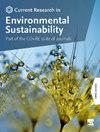公众对减少国外排放以达到国内目标的气候政策的看法——一个瑞士案例研究
IF 3.8
Q2 ENVIRONMENTAL SCIENCES
Current Research in Environmental Sustainability
Pub Date : 2025-01-01
DOI:10.1016/j.crsust.2025.100295
引用次数: 0
摘要
为了减缓气候变化,所有国家都必须减少温室气体排放。根据《巴黎协定》,各国可以在国内外减少与气候相关的排放,以实现国家自主贡献(NDCs)。考虑到成本效益和向发展中国家转移资金的能力,迄今只有少数国家使用国际转移缓解成果。虽然以前归因于对国内共同利益的偏好,但“气候反弹”可能已经改变了潮流。本文首次研究了一个已经参与国家自主贡献的国家内部对国外温室气体减排的舆论。瑞士是少数几个使用itmo的国家之一。一项人口调查(n = 4915)揭示了一种与其他形式的气候政策截然不同的支持模式,只有18%的人赞成减少国外的排放。这意味着,未来的研究应该研究在哪些条件下公众对itmo的看法会发生变化,以及感知的有效性、公平性和协同效益如何影响公众对利用外国减排来实现国内脱碳目标的看法。本文章由计算机程序翻译,如有差异,请以英文原文为准。
Public opinion on climate policies that reduce emissions abroad to reach domestic targets—A Swiss case study
To slow climatic change, all countries must reduce their greenhouse gas emissions. Under the Paris Agreement, countries can reduce climate-relevant emissions both domestically and abroad to meet their nationally determined contributions (NDCs). Remarked for cost-effectiveness and the ability to shift funds to Developing Countries, so far only few countries use Internationally Transferred Mitigation Outcomes (ITMOs). While previously attributed to preferences for domestic co-benefits, “climate backlash” might have changed the tide.
This paper is the first to study public opinion about greenhouse gas emission reductions abroad to meet NDCs within a country that already engages in it. Switzerland is one of the few countries using ITMOs. A population survey (n = 4915) reveals a pattern of support drastically different from other forms of climate policies, as only 18% are in favor of reducing emissions abroad. This implies that future research should study under which conditions public opinion on ITMOs alters and how perceived effectiveness, fairness, and co-benefits influence public opinion on the use of foreign emission reductions to meet domestic decarbonization goals.
求助全文
通过发布文献求助,成功后即可免费获取论文全文。
去求助
来源期刊

Current Research in Environmental Sustainability
Environmental Science-General Environmental Science
CiteScore
7.50
自引率
9.10%
发文量
76
审稿时长
95 days
 求助内容:
求助内容: 应助结果提醒方式:
应助结果提醒方式:


